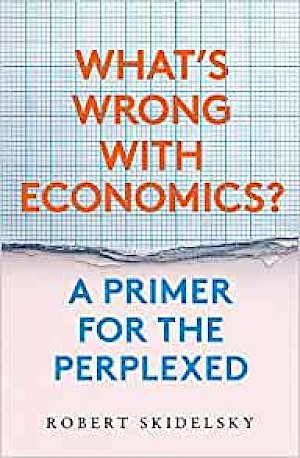23 July 2020
What's Wrong With Economics?
A Primer for the Perplexed
Robert Skidelsky
2020, Yale University Press, 248 pages,
ISBN 9780300249873
Reviewer: Bridget Rosewell, Senior Advisor, Volterra Partners

Everyone likely to read this review is an economist, indeed a professional economist. So, do we want to know the answer to the question in the title? There are two key reasons why we might. One is to understand how the outside world, our employers and our clients might see us. The other is to make sure that our own practice moves on. Keynes – and Skidelsky’s hero– said that policy-makers are slaves to a defunct economist. We must all make sure that we are not slaves to our own defunct economist. Indeed, I have been known to refer to myself as a recovering economist.
The book seems to be aimed at students and those coming across our strange tribe. It sets out the various criticisms that can be made against the standard model in economics: that agents cannot and do not maximise; that there is excessive mathematics; that institutions and ethics are ignored. Skidelsky also argues that the insights of behavioural economics, and other heterodoxies, are either ignored or treated as special cases of only limited relevance. All of this has resonance. I do remember sitting in a meeting in the Treasury and talking about infrastructure and its potential impact while an economist set out how maximising agents always exploited all opportunities. When I protested that the world wasn’t like that, the riposte was that it ought to be and we needed to make it more like the neo-classical paradigm. Skidelsky’s criticism that economics doesn’t seem able to distinguish between the normative and the positive in any practical way seems very valid.
The latest issue of the Economic Journal reinforces this divorce. The lead article– the EJ lecture – looks at the incentive effects of fines on families who do not send their children to school and the spill-overs between families. Nowhere does it ask whether the scheme is better or worse than campaigns on the value of education and it seems to me to be a very narrow perspective on the problem. Narrow perspective is a major criticism that Skidelsky makes.
Many of the other articles in this edition also betray what could be characterised as complacency about the power of mathematics and an effort to fit the real world into the model: for example, in how to justify the assumptions of the CES model and fit heterogeneity into it.
Skidelsky’s view that economists are too narrow and too unable to bring other perspectives to bear should be taken to heart in the profession, where we are not engaged in the battle for publication or tenure track position, but largely in that normative pursuit of better decisions about the world, whether in policy making or its implementation.
In that world, agents have a variety of motivations and it’s not appropriate to label every behaviour that doesn’t fit the paradigm as irrational and, therefore, somehow wrong. Our narrow concept of rationality can affect, and perhaps has affected, how people behave. The feedback loop is very powerful. Tell company leaders that their only target is shareholder value and that this is the criterion for the best possible world then that is an incentive that they may well accept and act on. The repercussions in validating ‘greed is good’ could be presented as incredibly damaging to society, to capitalism and indeed to the affected individuals.
Economics is not a positive, academic piece of analysis in almost anything that a professional economist does. It is designed to advise a decision and so we should be very careful what we wish for. We suggest markets can solve problems, and then try to design the discovery process that markets are good at out of the policy process because it creates uncertain outcomes.
Where Skidelsky falls down is on any advice to those of us still putting ‘economist’ on our passports as to how to practice the profession better. I would give one such piece of advice. Question the assumptions. Is it reasonable to assume that all agents are the same and behave in the same way? How far can past data be taken as a guide to the future? How good is the data anyway? Is there a solution to your model which can be reached in any reasonable time scale?
Be careful out there!
